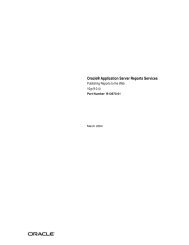Oracle Database Oracle Clusterware Installation Guide for HP-UX
Oracle Database Oracle Clusterware Installation Guide for HP-UX
Oracle Database Oracle Clusterware Installation Guide for HP-UX
You also want an ePaper? Increase the reach of your titles
YUMPU automatically turns print PDFs into web optimized ePapers that Google loves.
Configuring SSH or RCP on All Cluster Nodes<br />
You must configure SSH separately <strong>for</strong> each <strong>Oracle</strong> software installation owner that<br />
you intend to use <strong>for</strong> installation.<br />
To configure SSH, complete the following:<br />
2.10.3.1 Create .SSH, and Create RSA Keys On Each Node<br />
Complete the following steps on each node:<br />
1. Log in as the software owner (in this example, the crs user).<br />
2. To ensure that you are logged in as the <strong>Oracle</strong> user, and that the user ID matches<br />
the expected user ID you have assigned to the <strong>Oracle</strong> user, enter the commands id<br />
and id crs. Ensure that <strong>Oracle</strong> user group and user and the terminal window<br />
process group and user IDs are identical. For example:<br />
2-22 <strong>Oracle</strong> <strong>Clusterware</strong> <strong>Installation</strong> <strong>Guide</strong><br />
$ id<br />
uid=502(crs) gid=501(oinstall) groups=501(oinstall),502(crs)<br />
$ id crs<br />
uid=502(crs) gid=501(oinstall) groups=501(oinstall),502(crs)<br />
3. If necessary, create the .ssh directory in the crs user's home directory, and set<br />
permissions on it to ensure that only the oracle user has read and write<br />
permissions:<br />
$ mkdir ~/.ssh<br />
$ chmod 700 ~/.ssh<br />
4. Enter the following command:<br />
$ /usr/bin/ssh-keygen -t rsa<br />
At the prompts:<br />
■ Accept the default location <strong>for</strong> the key file (press Enter).<br />
■ Enter and confirm a pass phrase unique <strong>for</strong> this installation user.<br />
This command writes the RSA public key to the ~/.ssh/id_rsa.pub file and<br />
the private key to the ~/.ssh/id_rsa file.<br />
Never distribute the private key to anyone not authorized to per<strong>for</strong>m <strong>Oracle</strong><br />
software installations.<br />
5. Repeat steps 1 through 4 on each node that you intend to make a member of the<br />
cluster, using the RSA key.<br />
2.10.3.2 Add All Keys to a Common authorized_keys File<br />
Complete the following steps:<br />
1. On the local node, change directories to the .ssh directory in the <strong>Oracle</strong><br />
<strong>Clusterware</strong> owner’s home directory (typically, either crs or oracle).<br />
Then, add the RSA key to the authorized_keys file using the following<br />
commands:<br />
$ cat id_rsa.pub >> authorized_keys<br />
$ ls<br />
In the .ssh directory, you should see the id_rsa.pub keys that you have<br />
created, and the file authorized_keys.<br />
2. On the local node, use SCP (Secure Copy) or SFTP (Secure FTP) to copy the<br />
authorized_keys file to the oracle user .ssh directory on a remote node. The
















